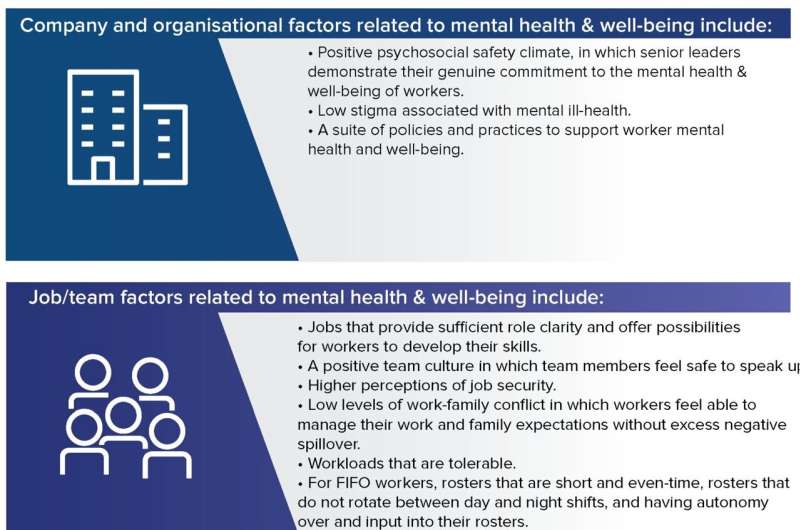This article has been reviewed according to Science X's editorial process and policies. Editors have highlighted the following attributes while ensuring the content's credibility:
fact-checked
trusted source
proofread
Mining worker study: Key insights into the state of WA mining's mental health

New findings from The Mental Awareness, Respect and Safety (MARS) Program Landmark Study show reports of unwanted sexual attention and sexual coercion are decreasing, but being put down or condescended to based on gender and receiving offensive sexist remarks remain common themes in Western Australia's mining sector.
Researchers from the Centre for Transformative Work at Curtin University surveyed more than 2,500 workers and conducted in-depth interviews with 60 individuals to gain insights into their experiences with a focus on three critical areas—creating mentally healthy workplaces, building a culture of safety and respect, and preparing for workplace safety in future mining.
MARS Program Landmark Study Chief Investigator John Curtin Distinguished Professor Sharon Parker said only four in ten WA mining workers reported feeling satisfied with their job, and nearly one in three said they were likely to try to find a new job with another employer in the next 12 months.
"Our research found one in three mining workers experiences emotional exhaustion regularly, indicating high levels of burnout. Disturbingly, covert forms of sexual harassment, including sexism and misogyny, persist," Professor Parker said.
"The negative impact of these experiences on mental health and well-being is evident, emphasizing the urgent need for change through improved work design, leadership, and organizational culture."
"With the mining sector constituting 10% of our workforce in WA and playing a pivotal role in our State's economic prosperity, this study is a crucial step in highlighting the mental health, safety, and well-being of workers."
Lead author Dr. Cheryl Yam said while the findings acknowledge workplace culture was improving as companies pay more attention to reducing discrimination and harassment, a collective commitment is needed to achieve meaningful and lasting change in building a respectful workplace culture.
"The mining industry is a leader in physical safety. With the support and resources from the MARS Program, we are confident that the mining industry is well positioned also to be a leader in mental health and well-being," Dr. Yam said.
"Our research findings provide a roadmap for meaningful action to address and reduce covert forms of sexual harassment and create respectful workplaces to attract, retain, and prevent harm to women and people in other minority groups."
Key findings:
- Most WA mining workers reported high levels of physical safety behaviors such as safety compliance and safety participation.
- Underreporting of notifiable safety incidents and near misses continue to exist in the industry.
- 41% of WA mining workers reported feeling satisfied with their jobs and 42% reported feeling a sense of thriving.
- 30% of mining workers reported high or very high levels of psychological distress, 38% reported feeling burnt out at work, and 31% reported an intent to leave their employer within the next 12 months.
- 60% of FIFO mining workers reported being satisfied with their accommodation while 73% of male FIFO workers reported feeling physically very safe in their work-provided accommodation compared to 53% of female FIFO workers.
- 16% of workers reported having experienced bullying (22% reported witnessing bullying) at least 2-3 times per month in the past six months.
- 41% of female mining workers reported they had experienced being put down or condescended to, while 34% reported receiving offensive sexist remarks (e.g., suggesting that people of your sex are not suited for the kind of work you do).
The Mental Awareness, Respect and Safety (MARS) Program Landmark Study: Insights from the Worker Survey and Interviews report can be found online here.
The release of the findings of the Mining Worker Study follows the launch of the Respect In Mining Toolkit developed by Curtin University's Collaboration for Evidence, Research and Impact in Public Health, to help WA mining companies create safer workplaces for women.
The landmark study forms part of the WA State Government's Mental Awareness, Respect, and Safety program, which was launched in December 2021. Advice stemming from the research has been submitted separately, and a follow-up study will take place in two years' time to assess the sector's progress.
More information: Report: www.wa.gov.au/system/files/202 … nsights_20240312.pdf
Provided by Curtin University




















